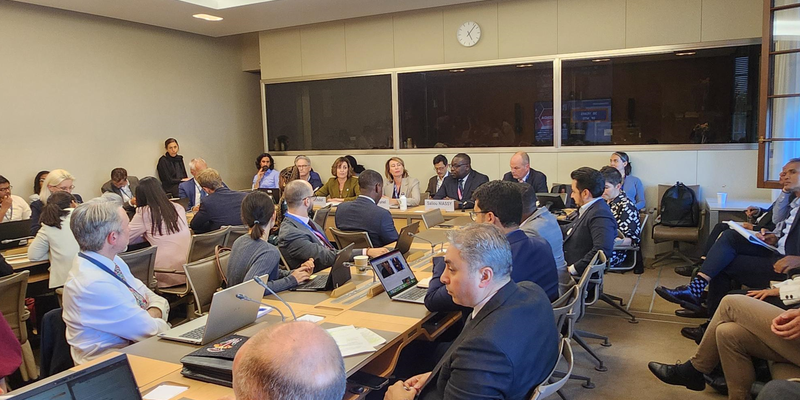FAO, IPPC call for global adoption of ePhyto to boost plant trade
Posted on Fri, 19 Sep 2025, 08:25

At the World Trade Organization Public Forum, FAO and IPPC champion the ePhyto Solution, a paperless, borderless system transforming trade in plants and plant products
18/09/2025
Geneva, Switzerland – The Food and Agriculture Organization of the United Nations (FAO), the International Plant Protection Convention (IPPC) and partners are leading a global charge to digitise and secure the trade in plants and plant products through the IPPC ePhyto Solution.
This innovative system, showcased in a FAO-IPPC-led session at the World Trade Organization Public Forum this week, is replacing outdated paper-based phytosanitary certificates, breaking down trade barriers to ensure faster, more efficient, and profitable trade and potentially saving businesses in 96 countries about USD 80 million annually. For decades, the trade community relied on paper certificates that were costly, prone to fraud and damage, often delayed or lost in transit, and environmentally wasteful. Exporters faced reissuance and costly delays, especially for perishable goods. The ePhyto Solution directly addresses these legacy challenges.
For countries trading in plants and plant products, paper phytosanitary certificates are mandatory, but cumbersome passports to move goods across borders. They confirm compliance with plant health regulations in importing countries and help manage the risk of spreading plant pests across borders. Approximately half of trading countries still rely on the paper-based system, which is costly, prone to error, counterfeiting, damage, causes delays in border clearance and bogs down global plant trade.
The ePhyto solution is the first global electronic system for trade in plants and plant products. By replacing paper-based phytosanitary certificates with a secure, standardised digital system, countries can enhance their access to foreign markets, boost their competitiveness and save costs. The system also reduces their carbon footprint and safeguards against plant pests.
The economic, environmental, and regulatory benefits to governments and the private sector are only set to increase as more countries adopt the ePhyto Solution — however the transformation requires stronger international collaboration, better integration with existing national systems and greater strategic investment.
“Today, the results are clear,” said Beth Bechdol, FAO Deputy Director-General and IPPC Officer-in-Charge, in her keynote address during the FAO-IPPC-led session at the 2025 World Trade Organization (WTO) public forum.
“The IPPC ePhyto Solution is faster, cheaper, and safer and our vision is for it to become the backbone of the digital transformation of global plant trade,” she said.
Bechdol also underlined that technology alone does not deliver transformation — people do. She pointed to the IPPC’s investments in training and onboarding, including the IPPC Health Campus e-learning platform, which equips plant health authorities and trade officials with the knowledge and tools needed to adopt ePhyto effectively. To make this possible, Bechdol called for more investment in ePhyto and emphasised IPPC’s role in boosting uptake though strengthening technical capacity through its e-learning programmes and tailored onboarding packages and urged stakeholders to collaborate in making the ePhyto Solution the digital engine for global plant trade.
A common digitisation agenda
The 2025 WTO public forum, held under the theme "Enhance, Create, and Preserve", brought together policy-makers, business leaders, representatives of development organizations and members of civil society to explore how digital advancements are redefining standards in the international trading system and enhancing global connectivity, innovation, trade and cooperation.
Symbolising this cooperation, other session speakers further demonstrated the value of ePhyto in global trade facilitation.
Sarah Brunel, Lead, Implementation and Facilitation Unit, IPPC Secretariat, commended the strong partnerships and common will to boost safe trade and achieve the Sustainable Development Goals.
Saliou Niassy, Coordinator of the Inter-African Phytosanitary Council (AU-IAPSC), African Union, highlighted the benefits and challenges of ePhyto adoption for national plant protection organizations in developing countries, particularly in Africa, despite the system’s potential to increase access to global agricultural export markets. Bill Gain, Global Lead for Trade Facilitation, World Bank Group, shared country success stories from Cote D’Ivoire, Fiji and Zambia, highlighting benefits to traders and governments and justifying the urgency of paperless trade in today’s global economy.
Philippe Isler, Executive Director, Global Alliance for Trade Facilitation, introduced the “ePhyto Africa Initiative”, a collective effort by partners advocating ePhyto, to support its adoption in 80 percent of African countries in 32 months through public-private partnerships.
An in-demand innovation
The IPPC ePhyto Solution was developed in 2014, when the Commission on Phytosanitary Measures — the IPPC’s governing body — endorsed the creation of a global electronic certification system. In 2017, the WTO’s Standards and Trade Development Facility provided seed funding to kickstart the programme.
A year later, 10 piloting countries connected to the newly built IPPC ePhyto Hub and exchanged their first electronic certificates.
To date, the system is used in 96 countries, enabling increased exports through exchange of over 250 000 electronic phytosanitary certificates monthly— more than 3 million certificates a year.
Thanks to the success of ePhyto in plant trade, Latin American and Caribbean countries are now exploring the introduction of electronic veterinary certification, demonstrating the power of digitisation across sectors. Looking ahead, Bechdol noted that the success of ePhyto in plant trade is inspiring the possibility of electronic veterinary certification in Latin American and Caribbean countries and could become a model for other cross-sector applications, demonstrating the power of digitisation across sectors.
Related information

